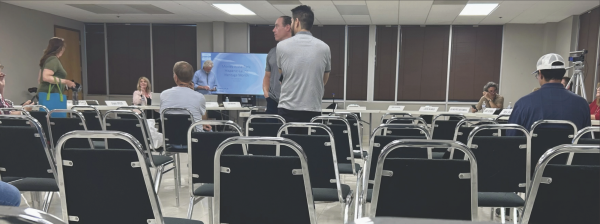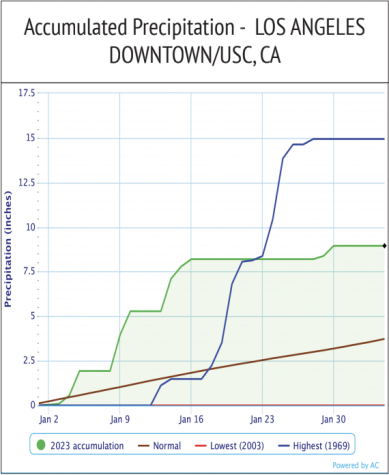Rising gas prices follow sanctions
Lucas Cohen-d'Arbeloff/Chronicle
A sign at a gas station in Studio City reflects the recent rise in fuel prices in Los Angeles, as well as throughout the nation.
March 20, 2022
California’s average price per gallon of gasoline ascended to $5.91 March 18, signaling record high prices for the country, according to NBC Los Angeles.
The U.S. enacted sanctions on Russian oil and gas imports following Russia’s military invasion of Ukraine, causing the increase of gas prices nationwide, according to CBS News. Even before the invasion, prices increased as oil companies failed to meet increasing demand from consumers who are commuting to work and traveling more often as COVID-19 case numbers decline.
Ofek Levy ’23 said these raised prices could take a financial toll on many Americans.
“[The rise in gas prices] is a huge deal especially for people who only have one way to get to school or for families who only have one car,” Levy said. “It’s really hard when gas prices go up because we buy a lot of gas here in California and especially Los Angeles (LA) because that’s how we get around places.”
Levy said he feels the city should increase public transportation to alleviate the effects of the gas price surge and the potential effects of future price fluctuations.
“In LA, people just need gas, so what are they going to do, not pay for gas?” Levy said. “This is tough for some people who now can’t get other things because they need to pay for gas. We should increase the amount of public transportation in LA and also have higher quality public transport. Not only would that cost a lot less money, it would also cut down on carbon emissions.”
Maddie Morrison ’22 said the gas price increase might greatly affect students who live far from campus.
“I do not think I’ve ever had to pay this much for gas,” Morrison said. “Rising gas prices might make it harder on people who commute to and from school by car, especially if they live far from school. For students who use a lot of gas in their daily lives [due to] commuting to and from their activities and school, it’s going to be more expensive to continue driving themselves. This might cause students to be more aware of carpooling, public transportation or other ways that they can save money while still getting where they need to go.”
Emma Miller ’23 said she opted to drive an electric car in part to avoid the effects of high gas prices.
“The decision to get an electric car centered around lessening my impact on the environment, avoiding the cost of gas and other cost incentives,” Miller said. “In addition, it’s very convenient to be able to charge my car at home as opposed to driving to a gas station.”






































